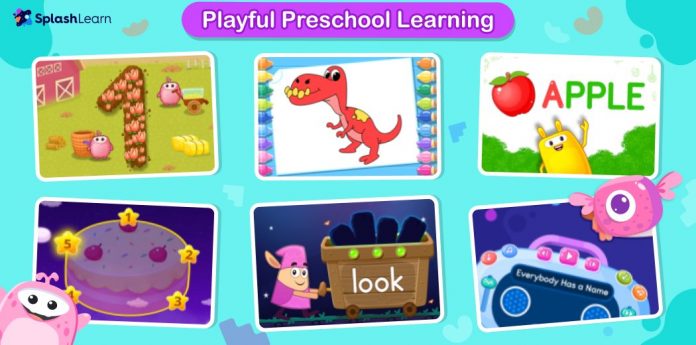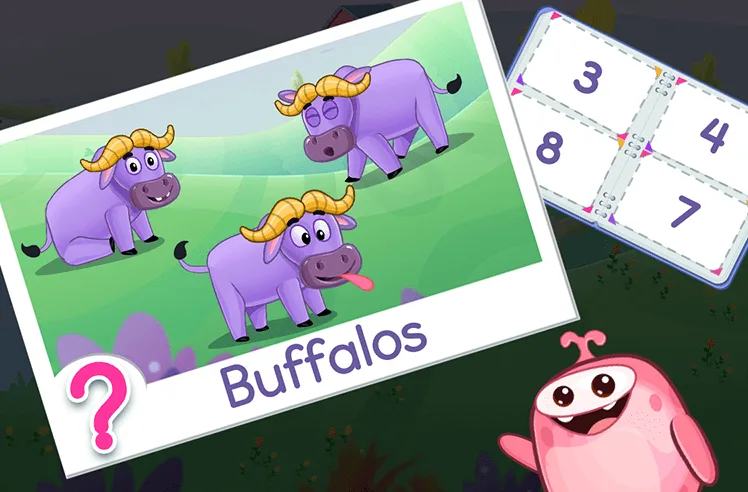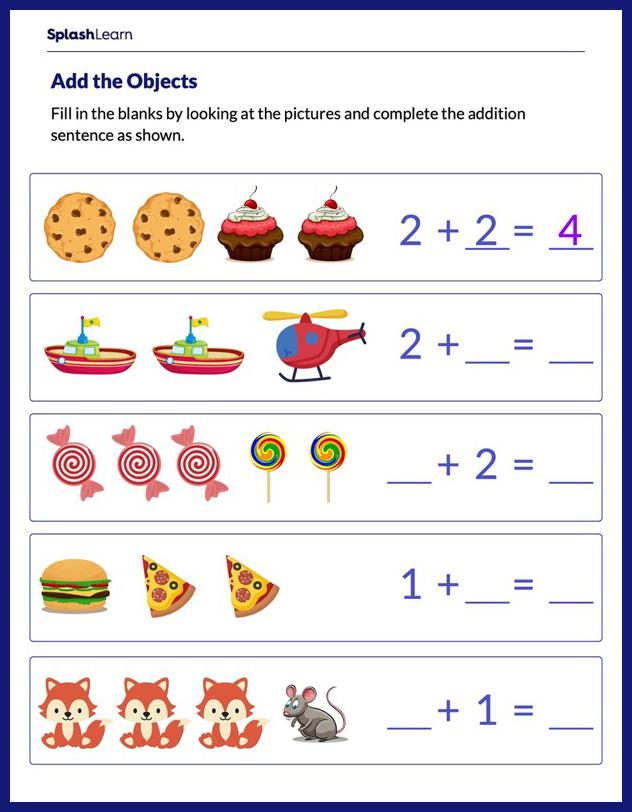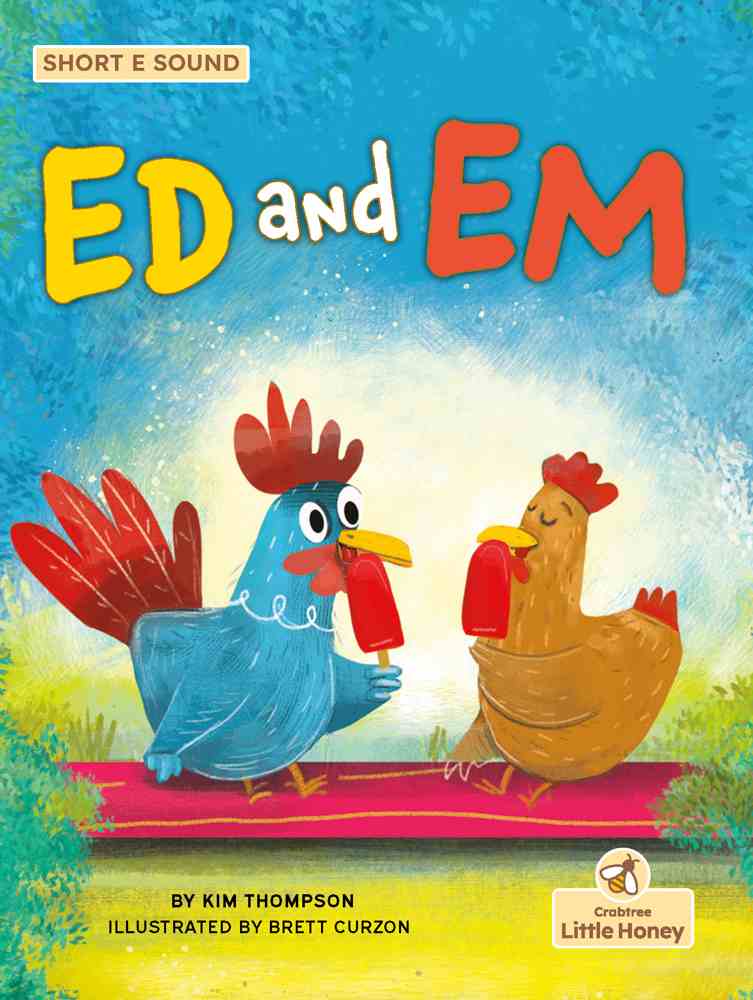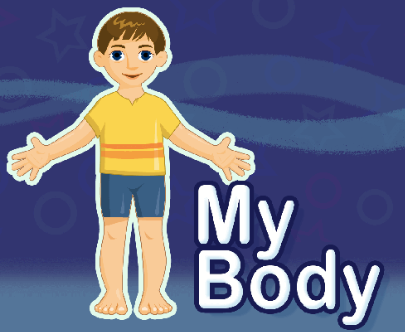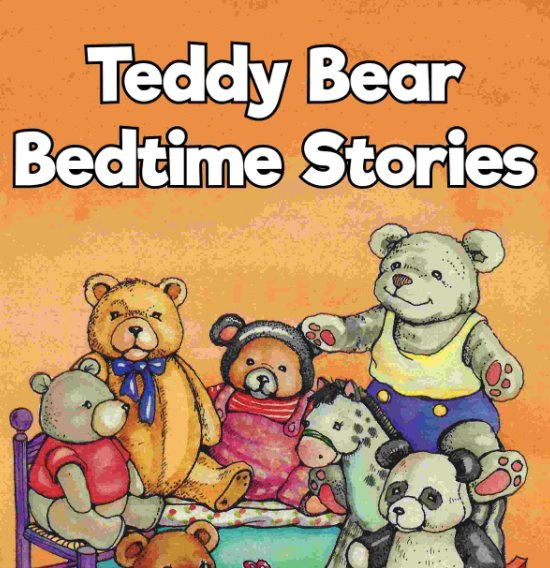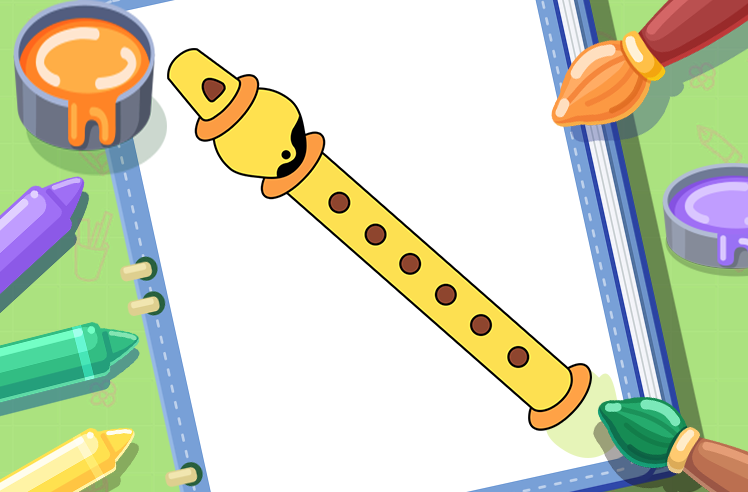- 1. Math Skills in Preschool
- 2. ELA Skills in Preschool
- 3. Motor Skills in Preschool
- 4. Art and Creativity in Preschool
- 5. General Knowledge in Preschool
- 6. Science Skills in Preschool
- 7. Social Studies in Preschool
- 8. Social and Emotional Development in Preschool
- 9. Thinking and Cognitive Skills in Preschool
- 10. Healthy Habits and Safety Practices in Preschool
What do kids learn in preschool? It is more than just ABCs and 123s! It also focuses on hands-on exploration and play-based preschool activities. From counting, singing fun alphabet songs, and exploring the world around them to developing essential social and emotional skills, preschoolers are busy little bees.
Math & ELA | PreK To Grade 5
Kids see fun.
You see real learning outcomes.
Watch your kids fall in love with math & reading through our scientifically designed curriculum.
Parents, try for free Teachers, use for free
Did you know that 90% of the human brain development happens by age 5? The first few years of life are a child’s golden age of learning and growth. Research reveals that early learning has a lasting impact on a child’s academic success and overall well-being. In fact, children who attend preschool tend to perform better in school and beyond.
While the typical age range for kids to start preschool is 3 to 4, this can vary. Understanding curriculum goals and exploring various extracurricular activities and teaching styles is important. This early preparation will give your child a great start before the school year begins, helping them make the most of their early education and smoothly establish a daily preschool routine.
11 Core Subjects and Skills Kids Learn in Preschool and Their Objectives
The preschool curriculum strikes a perfect balance between structured learning and creative play, fostering well-rounded development. What do preschoolers learn? From academic basics to playful activities, there’s so much to discover! In this section, we’ll dive into key preschool learning areas and show you how to support your child’s growth with engaging fun-filled resources.
1. Math Skills in Preschool
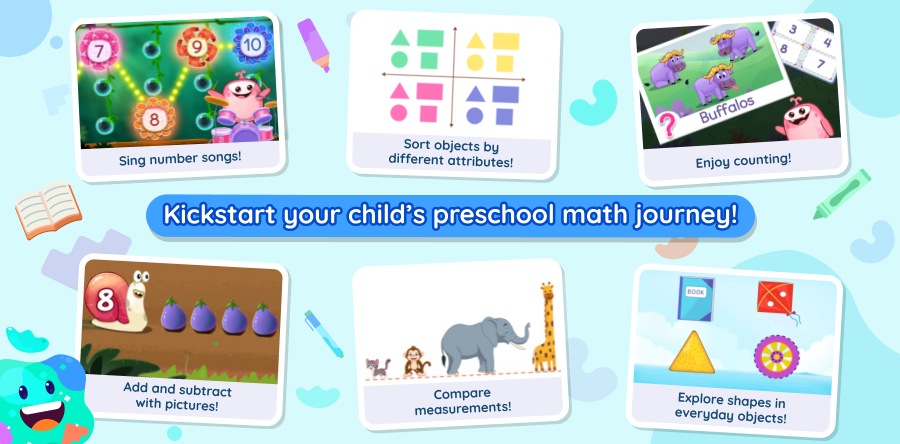
What do kids learn in preschool math? It is not just about numbers and counting. It’s about preparing little ones for kindergarten math and beyond. Kids will dive into essential preschool concepts—number sense, simple addition and subtraction, shapes, and more! This grade offers an excellent opportunity for teachers and parents to develop a love for math through play-based learning.
Here are important math topics and skills kids learn in preschool and well-aligned Pre-K math activities and resources to give them an early advantage:
I. Number Sense: Number sense is an intuitive understanding of numbers and their relationships. Teaching number sense to preschoolers helps them easily grasp basic number concepts like counting and comparing numbers. Here are important number sense skills and well-aligned activities parents can use to support their child’s learning:
- Know number names 0–10; know the counting sequence; understand the order in a counting sequence:
i) Count fingers and toes.
ii) Line up toys and count them.
iii) Count steps while walking.
iv) Use a number puzzle to arrange numbers 0–10.
v) Consider these interactive games in which kids learn numbers and the counting sequence through fun activities like singing number songs, connecting number stars, and matching numbers to cards:
- Identify and write numerals:
i) Trace numbers in sand or flour.
ii) Write numbers with sidewalk chalk.
iii) Use number stencils to practice writing.
iv) Daily practice is key. Identify the numbers your child finds particularly tricky to recognize and write. Give these printable tracing worksheets a try to help your child practice writing numbers 1-10 and improve their handwriting skills. The best part? They also get to color the number of objects that match the given quantity!
- Count to tell up to 10 objects (pictures, dots, shapes, etc.). Match numbers to objects using one-to-one correspondence:
i) Encourage kids to count household items–chairs, doors, stairs, and more!
ii) Match the number of toys as you count from 1 to 10.
iii) Here are fun counting games that challenge kids to count items such as animals and dots and match them with the correct number card.
- Compare the number of objects in two groups (using less than, greater than, fewer, and or equal to).
i) Use candies in a bowl to show “fewer” vs. “more.”
ii) Use playing cards to compare numbers.
iii) Here are interactive number comparison games in which kids will enjoy counting the number of objects in each group and making sense of which group has more or fewer objects:
- Identify the number of objects without counting (up to 5 objects).
Subitizing is an ability that helps kids quickly identify the number of objects without counting them individually. For example, looking at * * *, we immediately think—“3 stars.”
i) Spot groups of dots on dice.
ii) Quickly identify how many fingers are held up.
iii) Consider these helpful games where kids will observe objects in different arrangements, such as rectangular or linear, and identify the total number of objects using subitizing:
II. Addition and Subtraction: In preschool, learning addition and subtraction involves understanding the concept of putting things together and taking objects away. The more kids visualize these abstract concepts, the better they learn.
- Compose and decompose numbers.
i) Use fingers to show different ways to make 5.
ii) Break apart groups of candies into smaller sets.
iii) Draw numbers using dots, then split them up.
iv) Help preschoolers understand and see how to break numbers down and put them back together using visuals. Preschoolers are visual learners, meaning they understand and remember information better through pictures, colors, and visual cues. Here are interactive games to give them a head start:
- Understand addition as putting things together; understand subtraction as taking objects apart or away. Use real-world objects and manipulatives to demonstrate addition and subtraction word problems up to five.
i) Use math manipulatives to visualize addition.
ii) Take away snacks and count what’s left.
iii) Use fingers to add and subtract.
iv) Teach addition and subtraction hands-on. Make abstract concepts like “putting things together” and “taking away” come to life with vibrant games! These games use fun visuals, 10-frames, and pictures to help kids visualize addition and subtraction.
v) Strengthen addition and subtraction skills with fun printables designed for engaging pen-and-pencil practice! Kids will solve the addition and subtraction problems by observing the pictures of items added or crossed out.
III. Measurement: In preschool, learning measurement involves understanding size, quantity, and how measurable attributes compare. Kids learn basic concepts like big vs. small, tall vs. short, heavy vs. light, and more through fun measurement activities and hands-on experiences. Let’s go through key measurement skills kids learn in preschool and learning resources to give kids an early edge:
- Identify measurable attributes of objects—length, height, weight, and capacity.
i) Demonstrate the length of a table using hand gestures.
ii) Recognize a person’s height as the measurement from head to toe.
- Compare measurements using appropriate terms such as long-short, big-little, light-heavy, tall-short, wide-narrow, holds more-holds less, and same length/weight/amount.
i) Compare the height of toys.
ii) Fill cups with water to compare capacity. Pour water into cups to see which “holds more.”
iii) Line up objects to compare “long” and “short.”
iv) Consider online measurement games in which children compare the length, weight, and height of everyday familiar objects:
IV. Data Handling: Data handling in preschool is about teaching young children how to collect, organize, and analyze information.
- Group objects by common characteristics like color, size, or shape, and count how many are in each category.
i) Group toys by color and count each set.
ii) Sort buttons by shape and count how many.
iii) With our engaging sorting games, kids learn to organize everyday objects by type, size, or color while having a blast!
- Sort, categorize, and classify objects based on multiple attributes.
i) Sort toys by color and size
ii) Group clothes by type and color.
iii) Sort legos by shape and size.
V. Shapes: Shapes are an essential part of a preschool curriculum. They help children develop spatial reasoning skills, recognize patterns, and understand the world around them. Here are important shape concepts kids learn in preschool:
- Identify and describe simple 2D shapes—squares, circles, triangles, and rectangles. Identify shapes regardless of their orientations or size.
i) Draw simple 2D shapes of different sizes (small, big, medium) and orientations (upside-down triangle, rotated square, etc.). Ask kids to name them.
ii) Help kids explore different shapes with engaging, hands-on shape activities! Here are some fun games to begin with:
- Describe everyday objects using the names of basic shapes. –
i) Point out circles, squares, and triangles around the house—a round plate, a square window, or a triangular slice of pizza!
ii) Spot shapes in road signs during a walk.
iii) Incorporate these interactive games into kids’ play routines. Make learning shapes with real-world objects super fun for kids:
- Describe the relative positions of objects using terms such as up, down, over, under, top, bottom, inside, outside, in front, behind.
i) Play a scavenger hunt where kids find the object using positional words as clues. For example, the first clue is behind the door. The next clue is under the box.
ii) Help kids master positional words with fun, printable worksheets! Watch as kids explore space and direction, developing necessary spatial awareness skills while having fun.
- Sort 2D and 3D shapes and objects.
i) Sort shapes by drawing flat and solid ones.
ii) Group building blocks and paper cutout shapes.
- Create simple 3D shapes using manipulatives.
i) Build cubes with building blocks.
ii) Create pyramids using playdough.
iii) Form cubes using LEGO bricks.
Related Reading: Best Pre-k Math Tips To Develop Math Skills
2. ELA Skills in Preschool
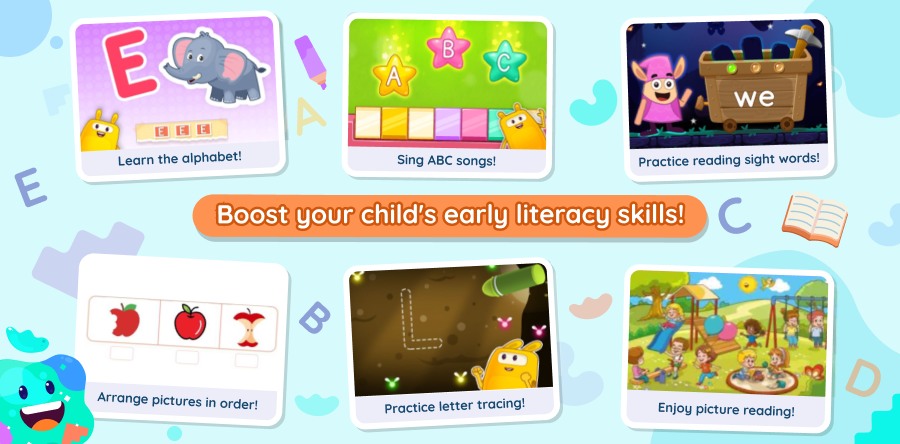
In preschool, English Language Arts (ELA) focuses on language development and early literacy skills. It includes phonological awareness, alphabet knowledge, and early writing. In preschool, kids understand what letters and words look like, how sounds relate to letters, and how to write simple words. The goal is to teach the basics of reading, writing, speaking, and listening through engaging Preschool Literacy Activities that develop a love for reading and language.
Here are essential ELA learning objectives for preschoolers and fun activities parents can use to give their child a head start in reading and writing:
- Alphabet, Phonics, and Word Recognition
- Learn letters of the alphabet. – Note that kids aren’t expected to learn all uppercase and lowercase letters at this stage.
i) Introduce kids to fun alphabet songs and help them identify letters in simple words (like their own names!).
ii) Point out letters in storybooks.
iii) Prepare your child for their language-learning journey with these interactive alphabet games that teach fun ABC songs, revise the alphabetical order, and help kids explore familiar objects associated with each letter.
- Understand letter sounds for various letters. Repeat the initial sound of a word.
i) Say the letter sound and find objects that start with it. For example, show the letter “B” and say the word “ball.” Emphasize the initial sound by saying “b-b-ball.”
ii) Try these interactive games that engage little ones in fun activities on letter sounds and words that begin with it:
iii) Practice letter sounds with alphabet flashcards.
- Identify their first name and familiar words from their surroundings. Detect sounds or spoken words.
i) Point out your child’s name in books or on labels.
ii) Say their name and have them recognize it in writing.
iii) Help kids learn through speaking. Emphasize important sound families, such as “F,” “Ch,” “B,” and “Va.”
iv) Try these engaging games in which your child will learn the skill of identifying sight words using just their sound.
- Identify and create rhyming words.
i) Help kids recognize sound patterns through rhyming words, improving their ability to decode words and enhance vocabulary.
ii) Try these fun worksheets that challenge kids to observe a given picture/word and identify the picture/word whose name rhymes with it. Kids will also enjoy fun activities like spotting a specific word in a rhyme.
- Reading Comprehension
Here are key reading comprehension skills children develop in preschool, along with related home activities parents can try with their child:
- Retell stories or create narratives using creative imagination. Use words learned to create new takes on existing stories. Identify characters, events, and settings in a story.
i) Use toys to act out a story they’ve heard.
ii) Ask them to retell their favorite story in their own words.
iii) Encourage them to change the ending of a story.
iv) Try these super fun printables that improve reading comprehension through engaging activities. Kids will practice finishing a story, retelling a story, filling in missing details, giving a twist to a narrative, etc.
- Describe the relationship between illustrations and the text.
This skill helps preschoolers understand the purpose of illustrations in a text and how they support the meaning.
i) Point out how illustrations match the words in picture books.
ii) Discuss what the pictures show that the text doesn’t say.
iii) Have them explain what’s happening in the pictures.
iv) Create task cards using engaging printables and challenge kids to observe illustrations and describe them, match them with texts, or pick a suitable description for a picture.
- Answer questions about unknown words in a text.
i) Pause during reading to ask about unfamiliar words.
ii) Have them guess the meaning of unknown words based on context.
- Identify parts of a book (theme, front/back cover, first/last word, first/last page, page number, etc.)
i) Point out the front/back cover, pages, and words in a favorite book
- Identify reality vs. fiction.
i) Discuss whether a story is real or make-believe.
ii) Ask them to spot things in the story that could not happen in real life.
- Connect the characters’ adventures to their own lives.
i) Encourage them to draw a picture showing how they relate to a character’s adventure.
Preschoolers have vivid imaginations and love to create their own stories. However, getting preschoolers to sit still for story time is often challenging for parents. The key is to choose books that match your child’s reading level and explore genres to see what captures their interests. Choose books that are visually engaging. Simple, repetitive stories with rhymes or rhythmic text are ideal, as they help kids predict what comes next.
Here are some fantastic books that use colorful full-page pictures and simple texts to keep the reading time more engaging. Read to your child, help them explore new words, meet exciting characters, and discover valuable life lessons.
III. Writing and Handwriting
- Explore different writing tools and materials (pencils, markers, etc.). Hold, manipulate, and use tools for writing, drawing, and painting.
i) Encourage your child to draw using paintbrushes and sponges.
ii) Have them trace letters or shapes with different writing tools.
iii) Use chalk on sidewalks for drawing and writing practice.
iv) Get started with these printables for early writing practice, featuring both uppercase and lowercase letters. Kids will also explore objects that start with each letter—an ideal way to build hand-eye coordination and strengthen the muscles needed for writing!
v) Consider these expertly designed games that help build the finger strength needed to draw letters with various shapes—standing lines, sleeping lines, curves, and more.
- Try to write simple, familiar words independently. Write your first name.
i) Encourage them to write their name on drawings.
ii) Write a shopping list of simple items like “milk” or “egg.”
iii) Let them label their favorite toys with simple words. Make it fun using colorful markers.
iv) These engaging worksheets are designed to give your child a head start. Each worksheet demonstrates how to write a word along the provided lines, allowing kids to practice and replicate these simple words.
- Use scribbles, shapes, pictures, and letters to represent objects, stories, experiences, or ideas.
i) Ask exciting questions and encourage kids to express their ideas and creativity.
ii) Ask them to draw a picture of their day. Let them use shapes to represent objects, like circles for faces.
iii) Combine letters and pictures to create a simple card.
iv) Boost their early writing skills with these printable worksheets, filled with exciting activities they’ll love—making greeting cards, tracing shapes, drawing animals, and more!
IV. Vocabulary
- Explore word categories and relationships between words. Show understanding of common verbs, adjectives, synonyms, and opposites (antonyms).
i) Introduce a new word daily and teach your child how to use it in a sentence.
ii) Encourage them to think of opposite words for these new terms.
iii) Use adjectives to describe favorite toys or objects.
iv) Try these worksheets to boost vocabulary through bite-sized exercises, such as matching synonyms or identifying opposite words with the help of pictures:
- Sort everyday objects into categories (like shapes or foods) to understand the concepts/themes they represent.
The idea is to help kids recognize patterns and connections in the world around them.
i) Sort kitchen utensils by their function.
ii) Group clothing items by type (socks, shirts, pants).
ii) Consider these vibrant, printable worksheets and watch as your child enjoys learning how everyday objects fit into different categories:
- Make real-life connections between words and their meanings.
i) Point to a door and say the word “open” while opening it.
ii) Say the word “soft” while touching a pillow.
- Differentiate between verbs that describe similar actions (e.g., walk, march, strut, and prance) by acting them out.
i) Play a game where they act out the verb you call out.
ii) Show the difference between running and jogging.
V. Speaking and Listening
- Join in conversations about age-appropriate topics and stories with peers and adults.
- Taking turns to speak. Express opinions about a topic.
- Tell a story with a beginning, middle, and end.
- Listen to a story or information and answer questions about specific details.
- Ask and answer questions to seek help or gather information.
- Describe familiar people, places, things, and events.
- Use non-verbal communication and spoken language to express ideas, needs, and feelings.
Engage in lively conversations about exciting topics. Ask questions, seek their opinions, and encourage them to share their ideas. Explore these fun worksheets to help boost your child’s communication skills. You can create task cards or use these worksheets to have a fun conversation with your child:
VI. Print Awareness
Preschoolers are also introduced to Print awareness.
i) It refers to a child’s understanding that printed text has meaning and is read in a specific way, typically from left to right and top to bottom.
ii) It includes recognizing the different parts of a book.
iii) It also includes understanding that words are made up of letters and words are used to tell a story or convey information.
This skill helps kids make connections between spoken language and written text.
3. Motor Skills in Preschool
Motor skills allow us to move and control our muscles. Both fine and gross motor skills are essential for a child’s development and help them with everyday tasks and activities. Children should learn larger and smaller motor skills in preschool, significantly improving hand-eye coordination, kinesthetic confidence, and balance. Your child should be able to write, cut, draw, paint, and perform rudimentary exercises based on provided input.
I. Fine Motor Skills
Fine motor skills involve small movements, like using fingers to pick up objects or writing with a pencil. They involve the small muscles in your hands and fingers.
- Boost fine finger movements, aiming, and precision through engaging activities.
Play-based learning is essential for preschoolers. Here are some fun games that incorporate activities like drag-and-drop, stacking, and aiming to enhance your child’s coordination and dexterity.
- Use and manipulate tools like plastic scissors and spoons to improve strength, dexterity, and control.
i) Practice cutting paper with plastic scissors
ii) Scoop and transfer objects using spoons
iii) Use tongs to pick up small toys or snacks
- Learn to hold and use different writing tools, such as pencils, markers, etc.
i) Practice drawing with crayons and markers.
ii) Switch between thick and thin markers to draw.
- Display better hand-eye coordination during tasks like building towers with blocks, solving puzzles, etc.
i) Create shapes with LEGO or building sets.
ii) Sort small objects into containers.
iii) Fit or drop shape toys into the correct slots.
- Use both hands together effectively and use opposing hand movements.
- Show progress in self-help tasks such as buttoning, combing hair, zipping, putting on and taking off clothes, tying shoes, etc.
Don’t miss this helpful blog: Fine Motor Activities For Preschoolers.
Read about fun, hands-on activities like playdough, bead stringing, and cutting paper to help kids develop crucial fine motor skills and enhance their hand-eye coordination and finger strength.
II. Gross Motor Skills
Gross motor skills involve larger movements, like running, jumping, or throwing a ball. They involve the large muscles in your arms, legs, and trunk. Preschool learning should also emphasize gross motor skills such as kicking a ball, stacking blocks, catching an object, playing with puzzles, and leveraging mind-muscle connections. Teachers should focus on empowering their children to explore their bodies through different tasks and objectives.
- Improve control over movements in activities like walking, skipping, kicking a ball, running, climbing, hopping, or using a wheelchair.
- Improve motor coordination in handling objects during physical activities like pulling, throwing, catching, kicking, etc.
- Improve balance and stability.
- Understand personal space and the space of others during interactions.
- Coordinate body movements with objects to accomplish tasks effectively, such as kicking a ball or riding a tricycle.
Related Reading: Best Movement Activities for Preschoolers
4. Art and Creativity in Preschool
This is one of the crucial subjects to teach preschoolers as it helps kids be creative and enjoy singing, coloring, music, dancing, drawing, and more. When kids do these things, they learn how to solve problems, have fun learning, and grow in all areas of development. As they express themselves through the arts, they also feel good about themselves.
Here are essential creative art skills kids learn in preschool and well-aligned fun learning activities :
I. Music:
- Explore both traditional and unconventional musical instruments.
i) Play simple tunes with a toy keyboard, flute, or piano.
ii) Check out these interactive games that teach children about different musical instruments, their details, and sounds, all through engaging coloring activities:
- Participate in musical activities like listening, singing, and fingerplay. Make music using different methods and tools, such as clapping or playing instruments.
i) Help kids learn rhymes, rhythm, jingles, and poems through fun musical activities.
ii) Clap hands to the rhythm of a song.
iii) Do finger play activities like “Itsy Bitsy Spider.”
iv) Try these jukebox games that are perfect for keeping preschoolers engaged while building a love for music and rhythm! Kids will enjoy learning classic jingles, popular songs, lullabies, and more!
- Express emotions and reactions to music.
i) Play different types of music and ask them to draw how it makes them feel.
ii) Encourage kids to use facial expressions and body movements to show how a happy or sad song makes them feel.
- Move to different patterns of beat and rhythm in music.
i) Clap along to the beat of a song, then switch to tapping feet or dancing to match the rhythm.
ii) Play different styles of music and encourage kids to march, hop, or sway according to the beat.
II. Drawing and Coloring:
- Express thoughts and feelings through drawing and painting. Share ideas, experiences, and knowledge through art.
i) Paint a scene from a favorite memory. Create a drawing to express how they’re feeling.
ii) Get kids excited with coloring games and activities based on fun themes like animals, food, or festivals! Spark their curiosity by asking questions about their artwork and sharing fascinating facts or stories.
iii) Here are some interactive games that go beyond coloring, offering kids fun facts about the objects they are coloring while they play. In these games, kids can use paint buckets, paint brushes, stickers, spray cans, pencils, and erasers to create fun artwork!
- Learn to plan, work independently, and stay focused on art projects.
i) Create a simple step-by-step drawing with minimal guidance, allowing them to plan and complete it independently.
ii) Give them a time-based task to finish a small art project, like coloring or cutting shapes, while focusing on staying engaged.
- Describe and talk about one’s artwork.
i) Ask them to explain what they drew or painted and what inspired it.
ii) Encourage them to give their artwork a title and share what it represents.
- Explore different colors, textures, and art techniques using materials like clay, natural items, wood, sewing, digital tools, and photography.
i) Experiment with clay by molding shapes and textures and discuss how it feels in their hands.
ii) Create a collage using leaves, wood, and other natural items, and explore different textures by touch.
Related Reading: 18 Best Color Activities for Preschoolers to Boost Creativity
III. Dramatic Plays:
- Engage in pretend play (creative play) to explore different roles, like family or community members.
- Use dialogue, actions, costumes, and props to tell stories and express ideas or feelings.
5. General Knowledge in Preschool
Preschoolers must have a general awareness of things they observe at home or in nature—food items, animals, birds, kitchen utensils, and more. It builds their vocabulary, boosts confidence, develops curiosity, and prepares them for school. We can help kids develop a solid understanding of the world around them through activities they love, such as coloring.
Give these interactive games a try! Kids can color various objects—birds, animals, food, and more! As they color, the game reveals fun facts about each object, making it a fun way to learn new things along the way!
6. Science Skills in Preschool
Science in preschool is all about exploring the world through hands-on activities and observation. Kids learn basic concepts like nature, plants, animals, weather, and cause-and-effect by asking questions, experimenting, and discovering new things in a fun, engaging way.
- Explore plants, animals, their habitats, life cycles, etc.
- Develop the ability to observe their surroundings and notice details.
- Explore hands-on activities like planting and caring for a garden.
- Understand how two colors can be mixed to create new colors.
- Learn about the five senses (taste, touch, sight, smell, and sound).
- Learn about seasons, weather conditions, cause-and-effect relationships, and life cycles.
- Incorporate scientific language using terms like observe, compare, contrast, measure, reflect, predict, and plan.
- Explore and discuss similarities and differences between two objects or materials.
- Understand the positive and negative influence of human behavior on the environment.
- Measure and mix ingredients to follow simple recipes.
Related Reading: 25 Best Science Activities for Curious Preschoolers
7. Social Studies in Preschool
- Learn about community helpers (e.g., police officers, teachers, cleaning crew, firefighters, garbage collectors, etc.) and their roles.
- Explore various cultures through festive celebrations, holidays, and traditions.
- Understand basic rules and laws that govern society.
- Learn about calendars, days, weeks, months, and years.
- Learn about different modes of transportation.
8. Social and Emotional Development in Preschool
Social-emotional development in preschool is about learning to get along with others, control feelings, and feel good about yourself. These skills help kids make friends, learn new things, and stay happy, even when things are tough. Knowing how to calm down and handle feelings is vital for this development.
Here are the important social and emotional skills kids learn in preschool:
- Concept of Self: Develop self-awareness, identify self traits (such as height), build confidence in self-skills, take pride in achievements, and manage tasks independently.
- Social Behaviour
- Communicate needs and feelings, recognize emotions in themselves and others, and act appropriately in different social situations.
- Develop positive relationships, build friendships, and show empathy and care for others.
- Follow the rules, use materials responsibly, and manage transitions while adapting to changes in daily routines.
- Cooperation:
- Use communication skills to join activities and engage in cooperative play.
- Take turns, negotiate, and compromise to resolve conflicts while accepting adult guidance and participating in various classroom tasks.
- Family and Community:
- Understand and describe family roles and relationships, as well as the roles of community members.
- Recognize and respect differences among people, identify with community groups, and describe local places and locations.
Related Reading: Fun Social Emotional Activities for Preschoolers
9. Thinking and Cognitive Skills in Preschool
- Remember and recall information, such as following multi-step instructions or stories.
- Ask questions and figure out solutions to simple challenges.
- Improve the ability to remember information and recall past experiences.
- Learn to concentrate on tasks for longer periods.
- Understand the concept of cause and effect and draw logical conclusions.
10. Healthy Habits and Safety Practices in Preschool
By teaching healthy habits and safety precaution skills early on, we can help children develop lifelong healthy behaviors and protect themselves from harm. Remember that kids learn by copying adults or peers. Modeling behavior and activities helps them understand how to do things themselves.
a) Healthy Habits
- Independently complete self-care tasks like dressing, brushing teeth, and washing hands while participating in physical activities to stay fit.
- Recognize the importance of healthy routines and differentiate between healthy and unhealthy foods.
b) Safety Practices
- Follow the rules, routines, and instructions to stay safe.
- Recognize danger and respond appropriately to unsafe situations.
11. Extracurricular Activities in Preschool
Preschoolers need extracurricular activities as much as they need academics. Activities like field trips, singing, storytelling, listening to guest speakers, and presentations can be very beneficial. Even camps and virtual meetups can help kids learn new skills and make friends. With these activities, your child can explore the world in a fun and exciting way. Using online resources, toys, and virtual hangouts, your preschooler can get ready for school and understand what learning is all about.
Extra-curricular activities offer preschoolers a wonderful opportunity to explore new interests, develop new skills, and have fun outside of the regular classroom setting. These activities can help children build confidence, socialize with peers, and learn valuable life lessons. Here are some fun extracurricular activities for preschoolers.
- Participate in storytelling sessions.
- Learn new skills (singing, dancing, etc.).
- Participate in outdoor activities like gardening, nature walks, bird watching, bug hunting, etc.
- Organize field trips, camps, book clubs, and virtual meet-ups.
Expected Learning Outcomes in Preschool
The preschool curriculum is designed to generate vital expected outcomes. Your child should be able to read at an elementary level while having an intuitive sense of counting and pattern recognition. These basic skills should be polished enough to be leveraged in kindergarten, first grade, and beyond. Kids should feel comfortable reading and writing fun stories, poems, and short answers.
When deciding what to teach preschoolers, focus on activities that promote cognitive, social, and motor development. The preschool curriculum plays a key role in a child’s growth.
In this section, we will overview Pre-K subjects and the primary learning outcomes. Here’s what a child should know by the end of preschool:
- Math: Develop basic counting, shape recognition, addition, subtraction, and problem-solving abilities.
- Early Literacy: Build foundational skills in letter recognition, phonics, and early writing.
- Motor Skills: Enhance fine and gross motor control through activities like writing and physical play.
- Art and Creativity: Foster creativity and self-expression through various art forms like drawing, painting, and crafting.
- General Knowledge: Gain awareness of the world around them, including family, community, and nature.
- Science: Explore plants, animals, the five senses, and basic scientific concepts through hands-on activities like observing, experimenting, and asking questions.
- Social and Emotional Development: Improve social interactions, emotional regulation, and cooperation.
- Healthy Habits and Safety Practices: Learn personal care routines and healthy lifestyle choices, including safety awareness.
- Thinking and Cognitive Skills: Strengthen critical thinking, memory, and problem-solving abilities through exploration and play.
Conclusion
We explored the exciting world of preschool learning, understood what is taught in preschool, and dived deep into what the preschool syllabus covers. In summary, a strong preschool curriculum blends diverse learning approaches, focuses on creating a nurturing environment, encourages active learning, and offers individualized attention to every child.
Parents and teachers can support children’s learning in fun, hands-on ways by incorporating engaging resources such as games, worksheets, and interactive activities. With the right tools and activities, preschoolers enjoy the process of learning, discovery, and growth.
Related Reading: What Do Kids Learn in Kindergarten
Frequently Asked Questions (FAQs)
What is the first thing preschoolers learn?
The first thing preschoolers should learn is counting and letters. These skills are foundational to all knowledge they’ll acquire throughout the year; starting here is best. You can enroll your child in online Pre-K math and reading learning platforms where they can learn at their own pace.
What should a 4-year-old know academically?
Let’s understand some key academic skills a 4-year-old child should know. They should be able to count, name letters, solve puzzles, and correctly recognize colors and shapes. They should also be able to communicate ideas, thoughts, and feelings, and grasp their address, geographical locations, and other academic concepts.
What do preschool teachers teach?
Preschool teachers cover various topics in their lesson plans, including counting, shapes, letters, songs, and physical activities. They use a variety of teaching tools like text, videos, images, and props to engage children and make learning fun. Additionally, they provide opportunities for hands-on activities such as painting, drawing, and cutting to help develop fine motor skills and creativity.
What are the seven areas of development for preschoolers?
The seven areas of development in Preschool, which are vital for teachers and parents to be mindful of, are –
- Communication and comprehension
- Exercise and kinesthetic development
- Emotional development
- Literacy skills
- Math and logical development
- World understanding development
- Creative skills

















